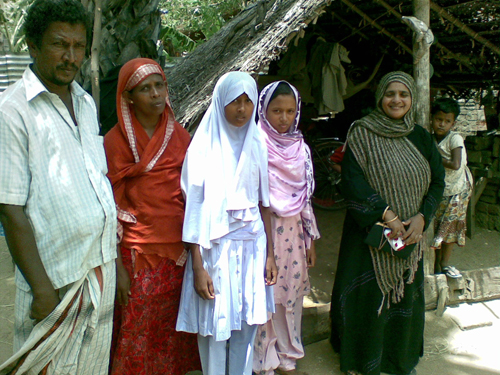Ban labour migration to Saudi Arabia: civil society groups urge
View(s):Civil society groups on Friday urged the Sri Lankan government to ban labour migration to Saudi Arabia and other countries that fail to adhere to international human rights labour standards and conventions.

File photo shows Rizana’s family in Muttur
A statement issued by the Law & Society Trust and signed by several religious dignitaries, NGOs and individuals, said the Government should proactively resolve the situation of Sri Lankan migrant workers languishing in detention camps and prisons across all host countries, including in Saudi Arabia, some of whom are also under sentence of death.
“We urge local and international stakeholders in the labour migration process including governments, national human rights institutions, and civil society organisations, to combine their efforts to protect the rights of migrant workers, ensure their equal and humane treatment, and stop trafficking, to avert future miscarriages of justice such as the judicial killing of Rizana Nafeek on 9 January 2013,” it said.
Here are excerpts of the statement: “We are shocked at the decision of Saudi Arabia’s Interior Ministry, under Prince Mohammed bin Nayef bin Abdul Aziz, to expedite and carry out Rizana Nafeek’s execution despite repeated appeals by the government of Sri Lanka, local civil society, the international human rights community, and members of her family.
We deplore the inadequacy of the Sri Lankan embassy in the Kingdom of Saudi Arabia, and the lethargy of relevant state authorities including, but not limited to, the Ministry of External Affairs, the Ministry of Foreign Employment Promotion and Welfare, and the Sri Lanka Bureau of Foreign Employment, to assist Rizana Nafeek during the process of arrest, detention and court trial which she underwent without suitable legal counsel and proper interpretation; and the anaemic efforts of the authorities to obtain her release and safe return to Sri Lanka during her seven years on death row.
The Kingdom of Saudi Arabia ratified the UN Convention on the Rights of the Child in 1996 which categorically states that no child shall be subjected to torture and that neither capital punishment nor life imprisonment without possibility of release can be imposed for offences committed by persons below eighteen years of age.
We consider Rizana’s seven years of imprisonment, prior to execution, as ongoing psychological torture.
The Convention on the Rights of the Child also guarantees that any child accused of committing an offence is guaranteed legal or other appropriate assistance in the preparation and presentation of their defence, not be compelled to confess guilt, and to have the free assistance of an interpreter if the child cannot understand or speak the language used. We demand that the Sri Lankan government enact and implement laws and policies on international labour migration which ensure the adequate protection of all migrant workers, especially women domestic migrant workers, as set out in the International Convention on the Protection of the Rights of All Migrant Workers and their Families which Sri Lanka ratified in 1995.”
Follow @timesonlinelk
comments powered by Disqus


















